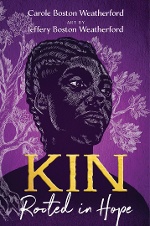Publishers' Preview: Diverse Books: Five Questions for Carole Boston Weatherford
In Kin: Rooted in Hope, Carole Boston Weatherford and her son, Jeffery Boston Weatherford, seek the story of their ancestors through poems and pictures.

This interview originally appeared in the May/June 2023 Horn Book Magazine as part of the Publishers’ Previews: Diverse Books, an advertising supplement that allows participating publishers a chance to each highlight a book from its current list. They choose the books; we ask the questions.
Sponsored by

In Kin: Rooted in Hope, Carole Boston Weatherford and her son, Jeffery Boston Weatherford, seek the story of their ancestors through poems and pictures.
 1. What aspect of your research for this book was the most challenging?
1. What aspect of your research for this book was the most challenging?
Confronting the unknowable. I could not determine from slave ship data on which ship my captive ancestors were human cargo. The earliest record I could find was for my fourth great-grandfather, who was already enslaved in Maryland in 1770. Despite local lore that my great-great-grandfather — a veteran of the U.S. Colored Troops — had ties to African royalty, I can claim no country or tribe. For now, that will have to do.
2. How does a deep knowledge of a location’s history affect how one exists in it today?
My family’s roots run deep in Talbot County, Maryland, where my kin were enslaved at Wye House alongside Frederick Douglass. He described my fourth great-grandfather in his autobiography. My enslaved ancestors are buried on the plantation. As freedmen, my great-great-grandfathers co-founded all-Black Reconstruction-era villages nearby. Land memory and ancestral spirits anchor me to that landscape.
3. Which came first, the structure or the poems?
 My mission came first: to mine the past for family stories, fading traditions, and forgotten struggles centering African American resistance, resilience, remarkability, rejoicing, and remembrance. Ancestors testify across time, conjuring place and plot.
My mission came first: to mine the past for family stories, fading traditions, and forgotten struggles centering African American resistance, resilience, remarkability, rejoicing, and remembrance. Ancestors testify across time, conjuring place and plot.
4. What’s the hardest part about collaborating with a family member on a book?
I felt a responsibility — to Jeffery and to our ancestors — to do the subject justice. The hard part was not knowing how my son’s illustrations would turn out. When I finally saw the art, I was blown away.
5. How do we best show young people the relevance of history to their lives today?
Cultivate empathy through stories that convey history’s emotional landscape and human toll. History naturally resonates with young people. They are wise enough to see injustices, to connect the past and the present, and to foresee future implications.
Sponsored by

Photo: Carole Boston Weatherford.
RELATED
ALREADY A SUBSCRIBER? LOG IN
We are currently offering this content for free. Sign up now to activate your personal profile, where you can save articles for future viewing.







Add Comment :-
Be the first reader to comment.
Comment Policy:
Comment should not be empty !!!